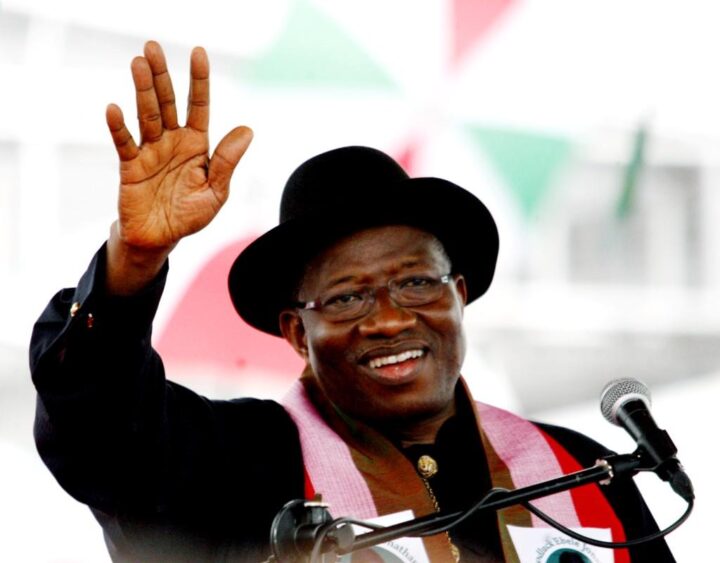BY OLADIPO AKANDE
Ordinarily, I wouldn’t have replied to Fredrick Nwabufo over his piece entitled “Sorry, Jonathan is not Coming Back” published on different online media platforms. But for the purpose of setting the record straight and not giving room for falsehood, I would like to address a few points Nwabufo raised on why he thinks Jonathan should not come back.
Truth is so obscure in these times, and falsehood so established, that, unless we love the truth, we cannot know it and as a patriot who desires the best for my country in times like this, I owe my fellow compatriots the duty to feed their minds with valid information.
Nwabufo in his piece talked about how corruption was prevalent under president Jonathan and he specifically made mention of a Federal High Court judgement in Plateau state on Tuesday which convicted Sarah Ochekpe, former minister of water resources under President Jonathan, of fraud.
Advertisement
In the judgement, Ochekpe and her accomplices were convicted and sentenced to six years imprisonment each by Justice H M Kurya of the Federal High Court, on an amended three-count charge of conspiracy and money laundering.
They were said to have received the sum of N450 million from Fidelity Bank Plc through cash and wire transfer by some oil companies and Diezani Alison-Madueke, former minister of petroleum resources, to influence the outcome of the 2015 presidential election.
Governor Peter Obi, was the Deputy Director-General of the 2015 Jonathan Election Campaign which was why his bank, Fidelity Bank was used. I doubt if someone like Peter Obi with high moral standards would have facilitated money laundering openly through his bank.
Advertisement
It is important to note that At the first hearing of the suit, Mrs. Ochekpe had told trial judge, Musa Kurya, that she handed over the said sum to the PDP governorship candidate in the 2015 gubernatorial election in the state, the late Gyang Pwajok.
EFCC prosecution counsel, Yusuf Muchaka, in 2018 said the accused persons breached the law by receiving money they knew was corruptly sourced.
Most of the people who served under Jonathan that are being hounded today by the EFCC were those who received funds for campaigns without knowing where the money came from. Yes, she was convicted for disbursing cash above N5 million but the money was not withdrawn from CBN nor was it from the government coffers.
It was money that was donated to the PDP by private oil company operators (who, by the way also contributed massively to the APC) in 2014-15 as a result of public and televised fund raising. Some in other states have been acquitted, many are still on trial while only few have been convicted.
Advertisement
It is disingenuous of Nwabufo to cite an obvious case of witch-hunt of Ochekpe and other cabinet members of Goodluck Jonathan’s administration by the EFCC as basis for labeling an administration that put the country on the trajectory of growth as being corrupt.
While reading through Fredrick’s piece on Jonathan’s return, my expectation was that he would back his claims with some sort of facts and figures but alas, all I saw were lies and poor attempts at painting Jonathan’s government in a bad light.
It appears we have forgotten so soon that Transparency International had ranked Nigeria 135th in 2014 and 136th in 2015 in its corruption Perception Index. Where is Nigeria’s position today? 154th. What would Fredrick say about this government with such a terrible record on corruption? I guess Jonathan is the easy target when it comes to an agenda like this.
It is absolutely important to remind Nwabufo that this same Jonathan’s government that he’s accusing of being corrupt, made so many attempts to curb corruption from our system by introducing the Treasury Single Account (TSA) to manage government funds. The TSA according to the CBN was primarily designed to bring all Government funds in bank accounts within the effective control and operational purview of the Treasury, in order to enthrone centralised, transparent and accountable revenue management, facilitate effective cash management, ensure cash availability, promote efficient management of domestic borrowing at minimal cost, allow optimal investment of idle cash, block loopholes in revenue management, establish an efficient disbursement and collection mechanism for Government funds, improve liquidity reserve and Eliminate operational inefficiency and costs associated with maintaining multiple accounts across multiple financial institutions.
Advertisement
Need I also remind us that the full implementation of the Integrated Payroll and Personnel information system (IPPIS) started under Jonathan in 2010?
Though the innovative payment system was conceptualized in 2006 and the pilot phase of its implementation started with 7 MDAs and having seen the benefits of the Scheme especially in the area of savings to the Government, the Federal Executive Council under the leadership of President Goodluck Jonathan in its meeting on Wednesday 1st December, 2010 approved the enrolment of all MDAs that draw their Personnel Cost from the Consolidated Revenue Fund (CRF) into the Integrated Payroll and Personnel Information System (IPPIS). The Phase II Service-wide implementation commenced under the platform of a new Software called Oracle Application in September 2011 in batches and that blocked so many loopholes where public servants were siphoning public funds from the treasuries.
Advertisement
Jonathan dealt with corruption by entrenching a system that prevents people from stealing and this is how to fight corruption. Fighting corruption requires building strong institutions and systems that will deny people unrestricted access to public funds. We all can agree that our major problem in Nigeria is structural and this was a man who wanted to tackle our problem from the structural level. Nigeria needs someone like President Jonathan who has the capacity to build our institutions and tackle problems from its root.
Lastly, I would like to remind my dear friend Nwabufo that this same ‘past’ that he is so averse to, was the era where Nigeria became the largest economy in Africa, overtaking South Africa and Egypt in the process and 26th in the world.
Advertisement
This same past that some of us are afraid to go back to, was when Nigeria became the number one destination for Foreign Direct Investment in Africa with the numbers rising from $24.9 million as at 2007 to over $35 billion in 2014.
Like Wole Soyinka would say, “history matters, records are not kept for the weakness of the memory, but as guides to the future.”
Advertisement
Akande writes from Los Angeles, US. He can be reached via @OladipoAkande on Twitter
Add a comment






